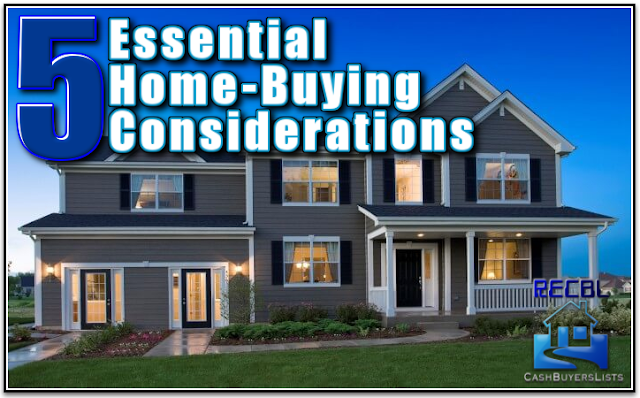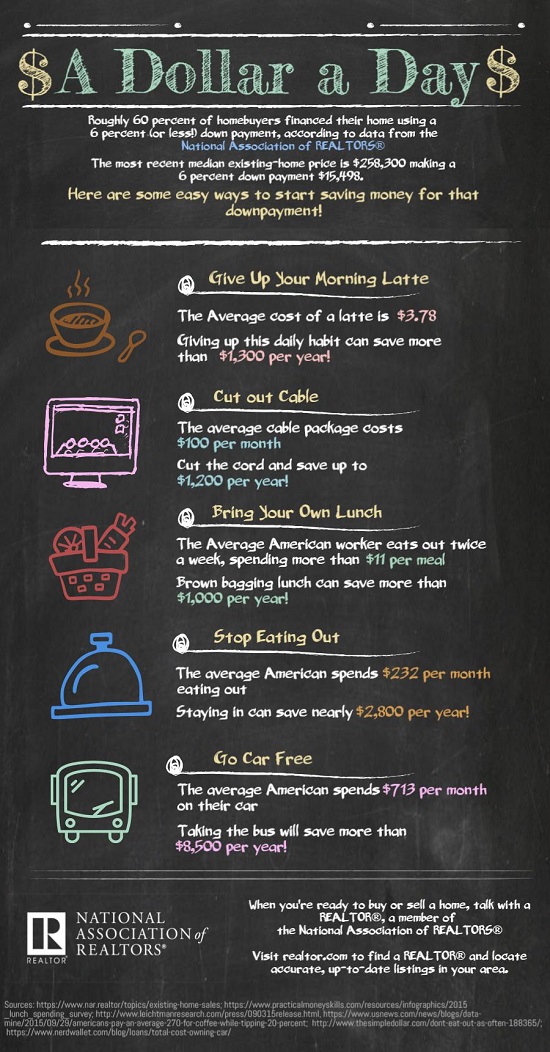Welcome to the Cash Buyers Lists Real Estate News Blog. We are here to provide valuable information to real estate agents, brokers and investors in order to help with their real estate businesses. Subscribe and receive immediate notification when we post.
Showing posts with label down payment. Show all posts
Showing posts with label down payment. Show all posts
Tuesday, December 12, 2017
Tighten that belt and save for a down payment
 |
| Tighten that belt and save for a down payment |
RECBL - Real Estate News
One of the biggest obstacles for first-time homebuyers is saving for a down payment - it's a nut that seems insurmountable to many. The first mistake new homebuyers make is believing that they must have 20 percent to put down on a home, when (depending on your credit and the loan terms) you can usually put down much less.
The second mistake is believing you'll never be able to save enough money. Here are 10 things you can stop spending money on right now. Collect what you would have spent on these items at the end of the week and put it into a savings account for your home-to-be. It will add up faster than you think!
Books. Get your library card renewed or (gasp!) get one for the first time, and start reading books for free.
Coffee. Treat yourself to a nice travel mug then fill up at home and skip the pricey coffee shop on the way to work.
Gas. Of course, this isn't always possible, but when you can, opt to walk or ride your bike instead of hopping in the car. Carpooling is another great option.
Lunch. Not only is brown bagging it cheaper, it's usually much healthier as well. Just be sure not to eat at your desk. Hit up the break room or a local park (bring your library book!).
Designer clothes. If you're a style hound, don't despair. Instead of shopping in pricey stores, check out your local outlet mall, online tag sales or high-end thrift shops. You'll be surprised at what you can find.
Restaurants. If going out to dinner is one of your favorite social activities, don't give up the act of dining with friends, just do it at home instead. Host a backyard cookout or an intimate dinner party with candles and fine china. Or, save money and time and make it a potluck affair.
Bottled water. Get yourself a filtered pitcher and a portable container and stop the bottled water insanity. Your wallet and the environment will thank you.
Expensive gifts. Believe it or not, it really is the thought that counts. Instead of wasting money on gifts that may or may not be used by the recipient, go the homemade route. Try baked goods, a photo collage, a collection of flowers from your garden tied in a pretty ribbon, or a home-cooked meal.
All those cable channels. Take a good look at your cable bill and decide whether or not you really need all those channels you're paying for.
Your gym membership. If you're not using your gym membership regularly, let it go. Stay healthy with online workouts you can do at home and venture into the great outdoors for walking, hiking and running or your favorite sports.
Do you have any additional tips on how to save money for a down payment, we want to hear about them. Contact us at marketing@cashbuyerslists.com.
CashBuyersLists.com Please like, comment and share. Thank you.
Tuesday, November 21, 2017
9 Ways to Save for a Down Payment
 |
| 9 Ways to Save for a Down Payment |
RECBL - Real Estate News
(TNS)-You’ve found the perfect house. Interest rates are still low. There’s just one thing standing between you and your dream home: a down payment.
Don’t abandon your homeownership dreams just yet. Here are nine ways to come up with the cash for your new home.
Pay Off Your Credit Cards
Paying bills will help in your hunt for down payment money. When you carry a credit card balance, the ever-accumulating interest charges mean more of your money goes to the card company each month.
Keep that cash for yourself by cutting your debt load. With the "avalanche" method, you prioritize your debts and pay the most on the one with the highest interest rate. Once that’s paid, shift your focus to the next highest rate and so on. You’ll get the most money-sucking credit card bills out of the way more quickly, freeing up more of your income to go toward building your savings.
Ladder CDs to Boost Savings
Once you have a few extra bucks, put it to work making more money for you. Certificates of deposit are low-risk and relatively accessible. But when interest rates are low, the return isn’t always what a saver hopes. You can maximize the earning power of CDs by opening different certificates at varying maturity dates.
For example, instead of buying one big CD, spread your money into three-month, six-month and one-year certificates. Known as laddering, this gives you flexibility to adjust your savings as rates change. Laddering allows you to lock in when rates are high and when rates are not so good. The process keeps you from being stuck for too long with low earnings.
Use Special Programs
There are many programs for homebuyers struggling to save for a down payment, especially for first-time homebuyers. Borrowers in a wide range of incomes, locales and professional groups may have access to aid from Fannie Mae and Freddie Mac, the government-sponsored offices that buy mortgages and package them as investments. Various nonprofit and community groups also lend a hand to buyers struggling to put money down on a home. And don’t forget about assistance from state agencies.
Tap Your IRA
If you’re looking to buy your first home, let the IRS help. Tax laws allow you to use up to $10,000 in IRA funds as a down payment if you’ve never owned a house. If you’re married and you both are first-time buyers, you each can pull from your retirement accounts, meaning a potential $20,000 down payment.
Even better is the IRS definition of "first-time homebuyer." Technically, you don’t have to be purchasing your very first home. You qualify under the tax rules as long as you (or your spouse) did not own a principal residence at any time during the two years prior to the purchase of the new home. In these instances, Uncle Sam waives the penalty for early withdrawal, but you may owe tax on the money, depending on the type of IRA.
Get a Gift
Aunt Edna always liked you best. Take advantage of that favored family status and ask her to make a present of your down payment. Tax law allows gifts of several thousand dollars a year to be bestowed without tax consequences to either the giver or recipient. The gift-exclusion amount is $14,000 for 2017 and is adjusted annually for inflation. The gift exclusion isn’t limited to relatives. The monetary present can be from anyone, so track down a well-off friend now.
Ask for a Raise
No luck finding a benefactor? Then maybe it’s time to ask your boss for more money. Just make sure you do your homework beforehand and base your request for a salary increase on your accomplishments rather than your needs.
Get a Second Job
Boss turned down your request for a raise? Moonlighting could help you earn the extra money. This option makes the most sense for those who are young and not yet fully established in their professional lives.
Look for Lost Money
Do you have any money stashed somewhere? Around $23.5 billion worth of matured savings bonds remains unredeemed, according to the Treasury Department, ignored by owners and not earning a penny of interest. Make sure your bonds and other investments are still adding to your net worth.
You could also have money languishing in an old bank account somewhere. You can file a claim with the Treasury to claim lost, stolen or destroyed savings bonds, or check the National Association of Unclaimed Property Administrators to see if you have any missing money.
Sell Unwanted Items
You likely have some used furniture you no longer use or old clothes that are no longer in style. Sell it to make a few more bucks to use for your down payment.
You can sell your items on sites like Craigslist, eBay, Facebook and Amazon to turn your trash into someone else’s treasure.
(C)2017 Bankrate.com
Distributed by Tribune Content Agency, LLC
CashBuyersLists.com Please like, comment and share. Thank you.
Wednesday, November 15, 2017
5 Essential Home-Buying Considerations
 |
| 5 Essential Home-Buying Considerations |
RECBL - Real Estate News
(TNS)-Buying a house is a life-changing process that requires lots of upfront financial planning.
When looking for a home, keep certain factors in mind, including your financial situation, types of available loans, your credit score, the price of the house and your down payment so you can navigate the process smoothly.
Your Financial Situation
Before you buy a house, make sure that your monthly budget can handle such a large expense.
Unless you’re one of the few people who can pay cash for a home, you’ll likely be paying it off for 15 or 30 years, depending on the length of your loan.
In addition to the mortgage payment, you’ll want to factor in expenses like property taxes, homeowners insurance and routine maintenance.
Types of Mortgages
When buying a home, you have a few options for the type of loan you want to use. Two of the most common mortgage types are fixed-rate and adjustable-rate mortgages.
The interest rate on a fixed-rate mortgage stays the same over the life of the loan, with payments divided up into equal amounts that you pay on a monthly basis. The longer the loan term, the less you have to pay each month; however, you’ll likely pay more in interest than you would with a shorter-term loan.
An adjustable-rate mortgage, or ARM, has a fixed interest rate for an initial period, followed by a period when the lender may periodically adjust the interest rate. For example, a 5/1 ARM has an introductory rate of five years. After that five-year period, the interest rate can change annually. With an ARM, you need to consider how much your monthly payment could increase and your ability to pay if it does go up.
Your Credit Score
You also need to review your credit score before buying a house. Your credit score helps creditors determine your creditworthiness. Borrowers with credit scores of 740 or higher generally qualify for the best mortgage deals.
It’s still possible to buy a house if you have bad credit. You likely will have to accept a higher interest rate on your mortgage, which could cost you hundreds of dollars extra per month.
If your credit score drops too low, though, you might not qualify for a mortgage at all. Consider improving your credit score first before trying to buy a house.
The Price of the Home
The higher the price of the house you want to buy, the more you can expect to pay on a monthly basis. When looking at houses, consider your budget and how much you can afford to spend.
Remember to consider your needs, too. Do you have a new addition to the family and need the room? Have your kids moved out and you want a smaller home?
Also, take a look at the price range of the houses available in the area where you want to buy. Compare the prices you find to your budget and determine what home you can afford.
The Down Payment
A large down payment represents one way to reduce the monthly cost of your mortgage. As a matter of fact, a down payment of 20 percent gives you access to better interest rates and prevents you from having to pay private mortgage insurance. So, in addition to lowering the amount you owe initially, a down payment also can get you a lower interest rate, making a house more affordable. There are also mortgages that require no down payment or a small one.
(C)2017 Bankrate.com
Distributed by Tribune Content Agency, LLC
CashBuyersLists.com Please like, comment and share. Thank you.
Why First-Time Homebuyers Are Not Getting In?
 |
| Why First-Time Homebuyers Are Not Getting In? |
RECBL - Real Estate News
First-time homebuyers are eager to enter the housing market. Getting in the door is another story. First-time homebuyers accounted for 34 percent of sales this year, less than the 35 percent share in 2016 and off an average 39 percent historically, the NAR 2017 Profile of Home Buyers and Sellers shows. First-timers bought costlier, but smaller homes than in 2016, at $190,000 and 1,640 square feet.
The kicker? Many first-timers are in a position to purchase, says NAR Chief Economist Lawrence Yun, but still shut out.
"The dreams of many aspiring first-time buyers were unfortunately dimmed over the past year by persistent inventory shortages, which undercut their ability to become homeowners," Yun says. "With the lower end of the market seeing the worst of the supply crunch, house hunters faced mounting odds in finding their first home. Multiple offers were a common occurrence, investors paying in cash had the upper hand, and prices kept climbing, which yanked homeownership out of reach for countless would-be buyers.
"Solid economic conditions and millennials in their prime buying years should be translating to a lot more sales to first-timers, but the unfortunate reality is that the nation’s homeownership rate will remain suppressed until entry-level supply conditions increase enough to improve overall affordability," says Yun.
Supply is so strained that 42 percent of homebuyers as a whole paid either at or over list price, the Profile shows.
"Many of those in the market to buy a home this year had little room to negotiate," Yun says. "Listings in the affordable price range drew immediate interest, and the winning offer oftentimes had to waive some contingencies or come in at or above asking price to close the deal."
There are factors in favor of first-timers. Homebuyers overall are having an easier time obtaining a mortgage, thanks to lenders loosening standards. Thirty-four percent of first-timers took out a Federal Housing Administration (FHA) loan, up from 33 percent in 2016.
First-timers are also benefitting from the expertise of real estate professionals. Eighty-seven percent of buyers overall relied on a real estate professional in their transaction.
"It’s no surprise a majority of first-time buyers indicated that the top benefits received from their agent were help understanding the buying process (83 percent), pointing out unnoticed property features or faults (60 percent), and negotiating better sales terms (51 percent)," says NAR President Bill Brown. "REALTORS(R) over the past year have helped buyers-and especially first-timers-navigate extremely competitive market conditions where the need to be prepared and act quickly has been paramount to the success of purchasing a home."
There are hurdles. On average, first-timers made a 5 percent down payment, and 25 percent of them reported the most challenging aspect of buying a home was saving for it. The majority of first-timers accumulated a down payment on their own (with 50 percent taking a year or more), while some received a gift from a friend or relative.
Another snag? Forty-one percent of first-timers reported they have student loan debt, with more than half in for at least $25,000. Fifty-five percent of those who reported the down payment as the hardest part of the process point to student debt as an obstacle.
"NAR survey findings on student debt released earlier this fall revealed that an overwhelming majority of millennials with student debt believe its delaying their ability to buy a home, and typically for seven years," Yun says. "Even in markets with a plethora of job opportunities and higher pay, steep rents and home prices make it extremely difficult to put savings aside for a down payment."
The savings and student debt struggle is undercutting not only the opportunity to become a homeowner, but also the opportunity for wealth. Home sellers have realized a median 26 percent ($47,500) since owning their home, the Profile shows, with those owning for just six or seven seeing a median 27 percent return.
For more on demographics, repeat buyers, sellers and more, view the NAR 2017 Profile of Home Buyers and Sellers.
For more information, please visit www.nar.realtor.
CashBuyersLists.com Please like, comment and share. Thank you.
Tuesday, September 12, 2017
Infographic: 5 Simple Ways to Save For a Down Payment
 |
| Infographic: 5 Simple Ways to Save For a Down Payment |
RECBL - Real Estate News
Approximately 60 percent of homebuyers financed their home using a 6 percent – or less – down payment, according to data from the National Association of REALTORS®. With the most recent median existing-home price clocking in at $258,300, a 6 percent down payment is $15,498.
Here are some simple suggestions from NAR on how potential buyers can cut costs and save for that down payment. For more information, please visit www.nar.realtor.
CashBuyersLists.com Please like, comment and share. Thank you.
Subscribe to:
Posts (Atom)
WHY USE PRIVATE MONEY LENDERS?
WHY USE PRIVATE MONEY LENDERS? 1. Private lenders for real estate are offering competitive interest rates Since a loan on an investment pr...

-
Consumers Keep Confident About Credit Cash Buyers Lists News Consumers are more confident about credit accessibility, with more ...
-
Millennial First Time Home Buyers Cash Buyers Lists News Millennials continue to make their way inland in search of affordable hou...
-
WHY USE PRIVATE MONEY LENDERS? 1. Private lenders for real estate are offering competitive interest rates Since a loan on an investment pr...


